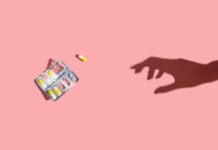Antipsychotics Ineffective Against Cocaine, Stimulant Addictions
Although cocaine and psychostimulant dependence are thought to be related to increased dopamine release, research from Tokyo and Long Island finds that the effect...
Common Side Effects Leading to Antidepressant Discontinuation
New research finds the negative drug effects most commonly associated with initiating antidepressant discontinuation are anxiety, suicidal thoughts, vomiting, and rashes.
J&J Settlement Inspires PA Legislators on False Claims Act
Following Johnson & Johnson's $2.2 billion settlement for off-label marketing and kickbacks related to its antipsychotic Risperdal, Pennsylvania legislators Brandon Neuman and Tony DeLuca...
Study Links SSRIs to Violent Crime in Youth
Individuals between the ages of 15 and 24 are more likely to commit a violent crime if they are taking an SSRI antidepressant than if they are not, according to new research out of Sweden. The study published in PLoS Medicine on Tuesday, suggests "warnings about the increased risk of violent behavior among young people taking SSRIs might be needed.”
Antidepressants, Antipsychotics, and Benzos All Increase Suicide Attempts in New Study
In a study of people with borderline personality disorder, only ADHD stimulants were associated with a decrease in suicide.
BJP Announces “The End of the Psychopharmacological Revolution”
The editor of the British Journal of Psychiatry, in a comment on Morrison et al.'s "Antipsychotics: is it Time to Introduce Patient Choice," announces...
FDA Approves Potential “Blockbuster” Sleep Drug
The US FDA on Wednesday approved a new type of drug for insomnia, called Belsroma. Last year, a lengthy investigative report in The New...
From EMPOWER to Exercise: What Actually Helps Older Adults Quit Benzos?
Despite clear risks, benzos and z-drugs remain widely prescribed to the elderly. New research explores what helps—and what doesn’t—when trying to stop.
More Time in Foster Care Linked to More Psychotropic Medicating
Children as young as four in foster care are taking three or more psychotropic medications, and the length of time that children aged six...
Antidepressant Withdrawal Commonly Misdiagnosed as “Mental Illness”
A new study reveals that more than two-thirds of patients experiencing antidepressant withdrawal were misdiagnosed with psychiatric disorders.
People Diagnosed with Bipolar Disorder at Increased Risk for Parkinson’s
Increased Parkinson's risk could be related to lithium, antipsychotic, and antiepileptic drug use.
Benzodiazepines Linked to Suicide, Study Finds
A new study finds that benzodiazepines—alprazolam (Xanax), lorazepam (Ativan), and diazepam (Valium)—are associated with an increased risk of suicidal events.
Children on Antipsychotics 50% More Likely to Develop Diabetes
Antipsychotic drugs increased the risk of children developing diabetes by 50%, and with an antidepressant added, their risk doubled.
Antipsychotics Again Strongly Linked to Falls and Fractures
Three independent studies in two journals reported strong links between antipsychotics and falls and fractures.
Australian Physicians Launch “No Drug Ads” Campaign
A group of physicians and academics in Australia has launched a campaign to ban all pharmaceutical company sales representatives from visiting any medical doctors...
J&J Takes Last Stab at $1.2B Risperdal Verdict
Lawyers for Johnson & Johnson took the stand in Arkansas today, a final effort at convincing the Arkansas Supreme Court to overturn a jury's...
The Future of Evidence-Based Psychotherapy
Researchers from the Brown University School of Medicine, writing in Clinical Psychology Review November special issue on the future of evidence-based psychotherapy, report that psychotherapy...
No Subgroup of Patients for Whom Antidepressants Are Effective
A reanalysis of STAR*D finds no support for the theorized subgroup of patients who do well on antidepressants.
Global Rise in ADHD Diagnoses: Medicine or Marketing?
The dramatic rise in ADHD spreading from the United States to the rest of the world is more an "economic and cultural plague" than...
Antipsychotic-induced Sexual Dysfunction Underreported
Researchers found some antipsychotics to be worse than others for causing sexual dysfunction.
How Providers Can Support Psychiatric Drug Discontinuation
Supportive patient-practitioner relationships are crucial to the successful discontinuation of psychiatric medication.
No Proven Treatments of Any Kind for Psychosis or Schizophrenia in Children or Youth
There are no proven treatments of any kind for children or adolescents experiencing psychosis or schizophrenia, according to a meta-analysis of randomized comparison trials published in PLOS One.
$8 Million Awarded to Family Of Man Who Died in Risperdal Trial
A California jury ruled that Johnson & Johnson’s Janssen Pharmaceutical and a psychiatrist were responsible for the death of 25-year-old Leo Liu. During a clinical trial for Risperdal, Liu died of a heart injury that was “further complicated” by the drug and ignored by the study doctors. Janssen was found 70% responsible for Liu’s death and ordered to pay $5.6 million to the family.
Antidepressants Blunt Ability to Feel Empathy
A new study suggests that taking antidepressants impairs empathy, while the experience of depression itself does not.
Social Phobia is Not a Neuropsychological Deficit
Researchers at the University of Central Florida, saying "there are relatively few existing studies examining neuropsychological functioning in social phobia," found no difference across...


















